This section outlines the cluster system configurations that are possible when a cluster configuration is used for the schedule server only (with the execution server being set up on a separate node).
1:1 active/standby configuration
In this configuration, the way that jobs are taken over by the standby node differs in the non multi-subsystem operations and the multi-subsystem operations.
Non multi-subsystem operation
In the following figure, Node 1 is running as the active node, and Node 2 is running as the standby node.
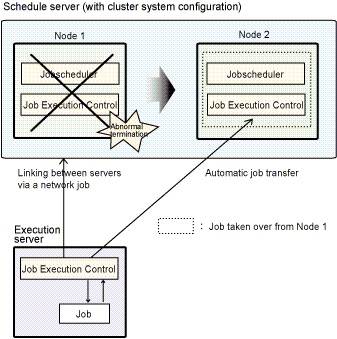
If error occurs with Node 1, jobs are taken over by Node 2. Network jobs running on the execution server are automatically taken over by Node 2.
Multi-subsystem operation
This operational configuration is available in following cluster systems:
PRIMECLUSTER for Solaris version
PRIMECLUSTER for Linux version
MC/ServiceGuard
HACMP
In the following figure, Node 1 is operating as the active node, and Node 2 is operating as the standby node. This figure shows an example where the multi-subsystem operation is implemented in Subsystem 0 and Subsystem 1, and error occurs with Node 1. If error occurs with Node 1, all the jobs in Subsystem 0 and Subsystem 1 are taken over by the standby node.
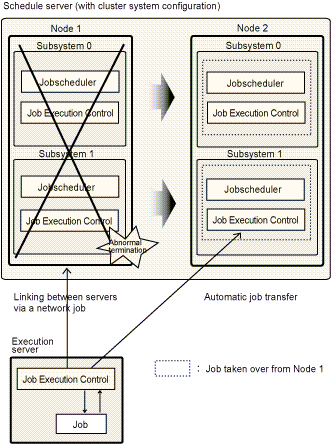
If error occurs with Subsystem 1 on Node 1, the jobs in Subsystem 0 are also taken over by Node 2. Network jobs running on the execution server are automatically taken over by Node 2.
The configurations -- the non multi-subsystem operation in 1:1 active/standby configuration and the multi-subsystem operation in 1:1 active/standby configuration--are each referred to as the follow:
1:1 active/standby configuration (without subsystems)
1:1 active/standby configuration (with subsystems)
The term "1:1 active/standby configuration" includes 1:1 active/standby configurations without subsystems, active/standby configurations with subsystems, and active/standby configurations with subsystems and partial cluster operation.
N:1 active/standby configuration
This operational configuration is available in following cluster systems:
PRIMECLUSTER for Solaris version
PRIMECLUSTER for Linux version
Oracle Solaris Cluster
MC/ServiceGuard
In the following figure, Node 1 and Node 3 are operating as the active nodes, and Node 2 is operating as the standby node.
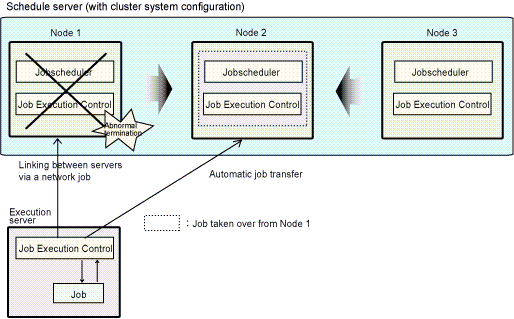
If error occurs with either Node 1 or Node 3, jobs are taken over by Node 2. Network jobs running on the execution server for Node 1 or Node 3 are also automatically taken over by Node 2.
If errors occur on more than one node, then only jobs from the node where error occurred first will be taken over by the standby node. Jobs from the second failed node will not be taken over.
Dual node mutual standby configuration
In the following figure, Node 1 and Node 2 are on standby for one another while each node executes its own jobs, with the execution server placed on a separate node.
In this example, if error occurs with Node 1, jobs are taken over by Node 2. Network jobs running on the execution server for Node 1 are also automatically taken over by Node 2. If error occurs with Node 2, jobs are taken over by Node 1. Network jobs running on the execution server for Node 2 are also automatically taken over by Node 1.
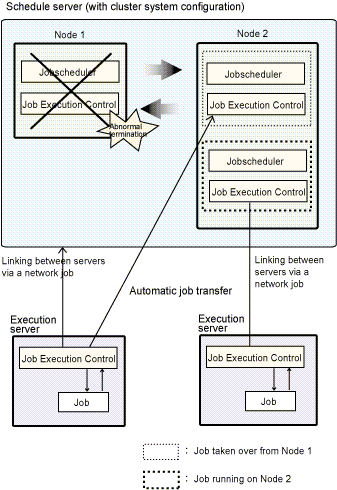
Cascading configuration
This configuration is available only in PRIMECLUSTER.
In the following figure, Node 2 and Node 3 are on standby while jobs are executed on Node 1, with the execution server placed on a separate node.
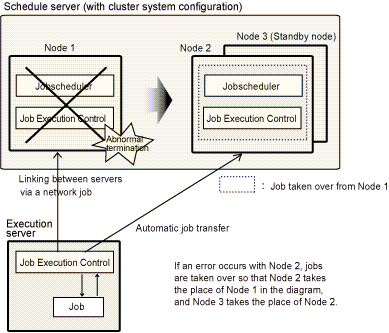
If error occurs with Node 1, jobs are taken over by Node 2. Network jobs running on the execution server for Node 1 are also automatically taken over by Node 2. If error occurs with Node 2, jobs are taken over by Node 3. Network jobs running on the execution server for Node 2 are also automatically taken over by Node 3.